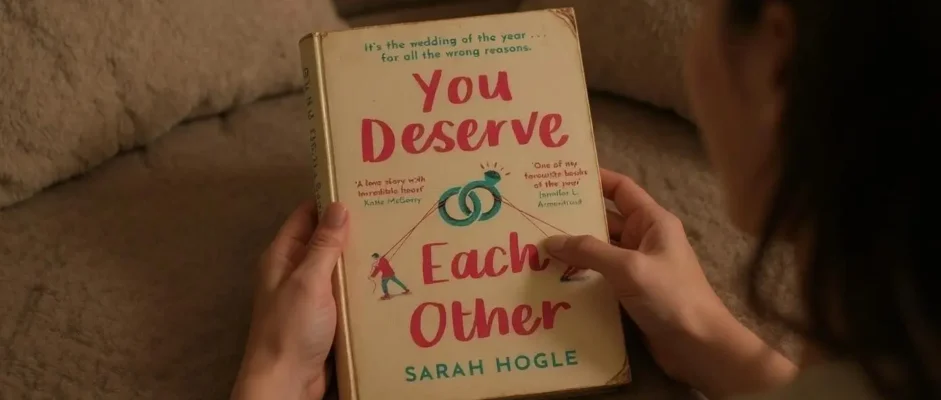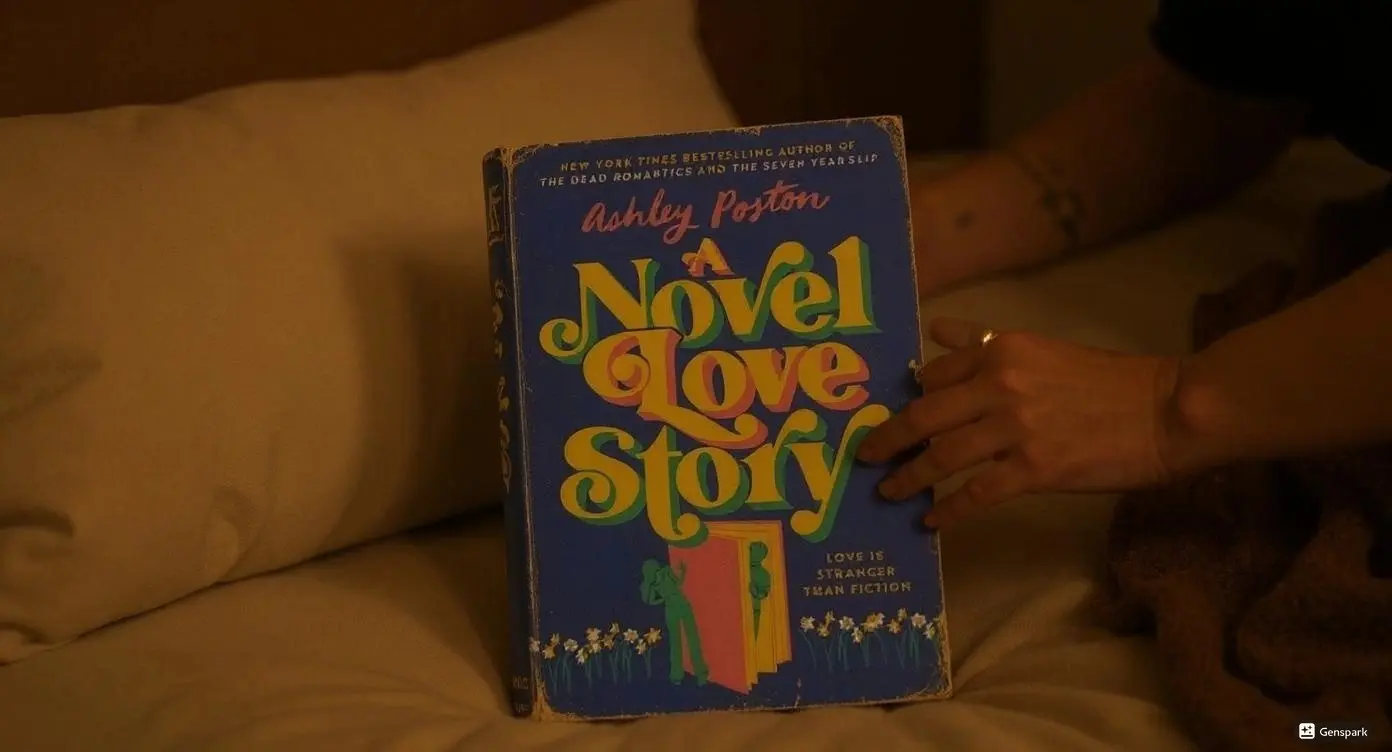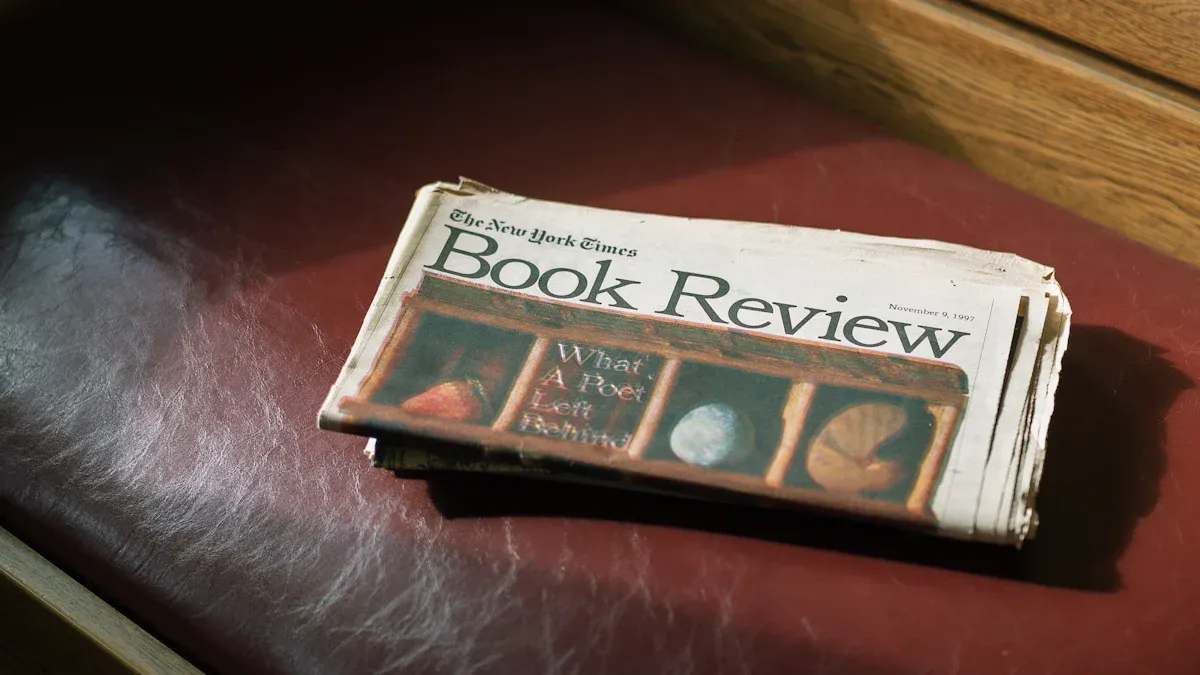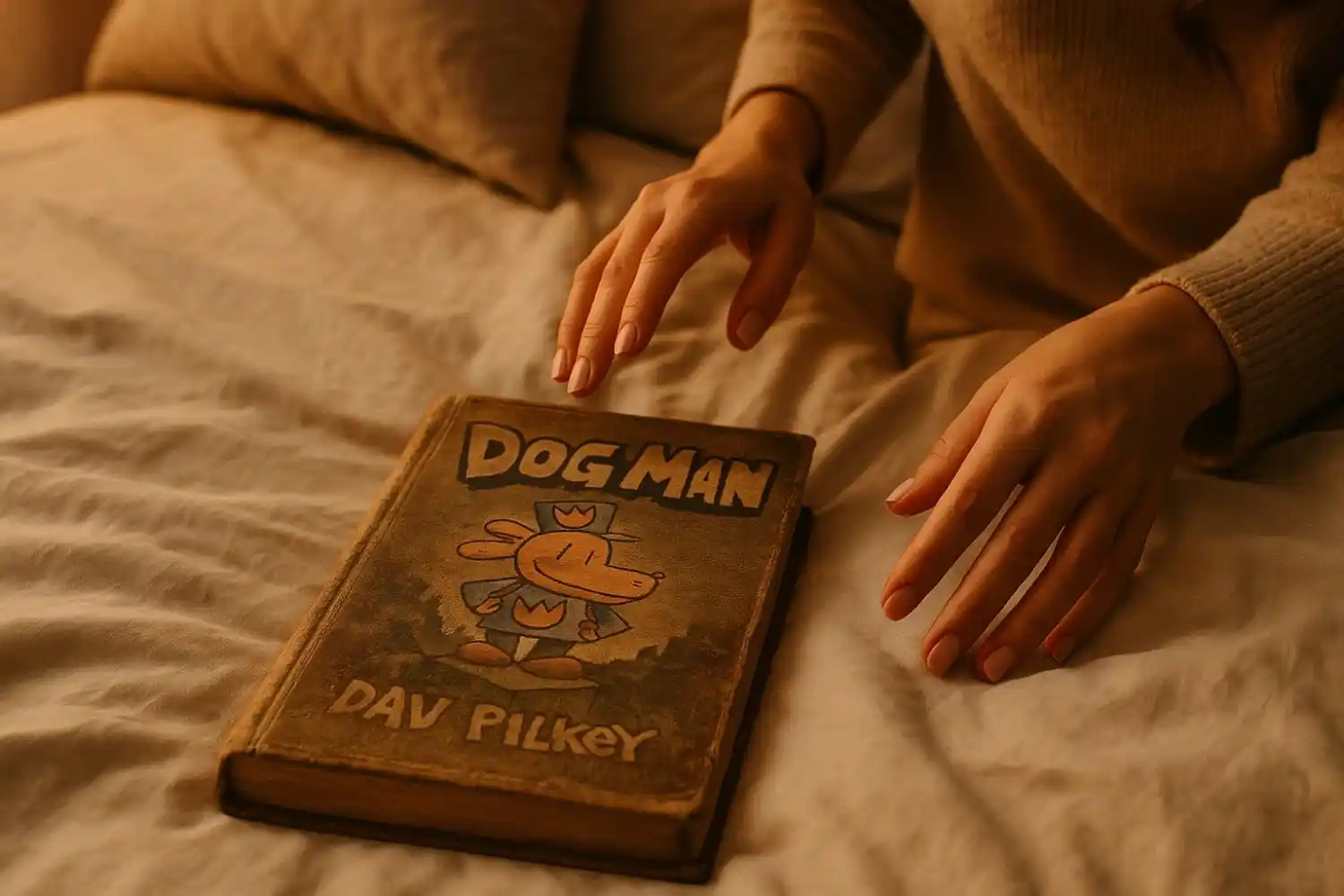I stumbled across “You Deserve Each Other” during one of those late-night Amazon browsing sessions when sleep seemed impossible and my TBR pile felt overwhelming. Sarah Hogle’s debut had reviewers calling it “legitimately so funny she may be responsible for saving my husband’s life” – now that’s a hook I couldn’t ignore. After devouring this lovers-to-enemies-to-lovers masterpiece in a single sitting (much to my cat’s annoyance as I kept laughing out loud), I can confidently say this book redefined my expectations for contemporary romance.
Picture ‘How to Lose a Guy in 10 Days,’ only if the couple is already engaged, and therefore in a battle of wills to see who will back out of their betrothal first. Naomi Westfield and Nicholas Rose are three months away from their wedding when they both secretly decide they’re done. What follows is a hilariously destructive game of relationship chicken that’ll leave you questioning everything you thought you knew about love and compatibility.
As someone who’s read over 3,000 romance novels and reviewed hundreds for Dionysus Reviews, I’ve grown weary of the same recycled plots. But Hogle brings fresh perspective to tired tropes through razor-sharp wit and authentic emotional depth. This isn’t just another enemies-to-lovers story – it’s a brutal examination of what happens when two people stop pretending to be perfect for each other.
Key Takeaways
The power of authentic communication transforms relationships more than grand romantic gestures ever could. Hogle masterfully demonstrates how Naomi and Nicholas’s initial sabotage attempts actually force them to reveal their true selves.
Self-discovery often requires dismantling the version of yourself you’ve performed for others. Naomi’s transformation from doormat to someone who speaks her mind feels both shocking and inevitable.
Small-town expectations and family pressure can suffocate individual identity within relationships. The Morris, Illinois setting becomes a character itself, representing societal pressure to conform.
Mental health struggles don’t disappear with love, but the right partner will support your growth. Naomi’s anxiety isn’t magically cured – it’s acknowledged and worked through together.
Second chances in love require both people to change, not just forgive past mistakes. This book avoids the trap of having only one character grow while the other remains static.
Basic Book Details:
- Publishing Information: April 7, 2020 by G.P. Putnam’s Sons
- Genre: Contemporary Romance, Romantic Comedy
- Plot: Engaged couple secretly tries to make the other break up first to avoid wedding costs
- Series Information: Standalone novel
- Page Count: 368 pages
- Main Characters:
- Naomi Westfield: Anxious people-pleaser who discovers her authentic voice through sabotage
- Nicholas Rose: Emotionally distant architect learning to express vulnerability
Plot Summary And Premise Analysis
Lovers-To-Enemies-To-Lovers Subgenre Innovation
Hogle takes the familiar enemies-to-lovers framework and flips it brilliantly. Instead of strangers learning to love, we watch lovers learning to hate – then rediscovering what drew them together originally. This reverse psychology approach creates genuine tension because we’ve already seen glimpses of their compatibility.
The wedding sabotage premise drives the plot forward with dark comedy. Naomi starts small – serving Nicholas’s least favorite meal, “forgetting” to pick up his dry cleaning. Nicholas retaliates by inviting his obnoxious friends over constantly and volunteering Naomi for every church committee.
Wedding Sabotage And Financial Stakes Examination
The financial stakes feel refreshingly realistic. With $30,000 already spent on deposits, neither can afford to be the one who calls off the wedding. This monetary pressure adds believable motivation beyond just wounded pride.
Their escalating pranks range from petty (Nicholas programming Naomi’s radio to only play death metal) to elaborate (Naomi convincing his mother she’s become a vegan raw food enthusiast). Each sabotage attempt reveals character depth while advancing the plot.
Character Development And Psychological Depth
Naomi Westfield’s Self-Discovery Journey And Anxiety Themes
Naomi begins as every people-pleaser’s worst nightmare – she’s molded herself so completely to Nicholas’s preferences that she’s lost her own identity. Her anxiety manifests in overthinking every social interaction and constantly apologizing for existing.
Her transformation isn’t sudden or unbelievable. Small acts of rebellion (wearing bright colors Nicholas supposedly hates, speaking up to his condescending mother) gradually build her confidence. The emphasis on communication and working through your issues was strong in this book, particularly regarding Naomi’s mental health struggles.
The anxiety representation feels authentic, not romanticized. Naomi’s panic attacks aren’t cute or quirky – they’re messy, embarrassing, and interfere with her daily life. Her growth involves learning coping strategies, not being “fixed” by love.
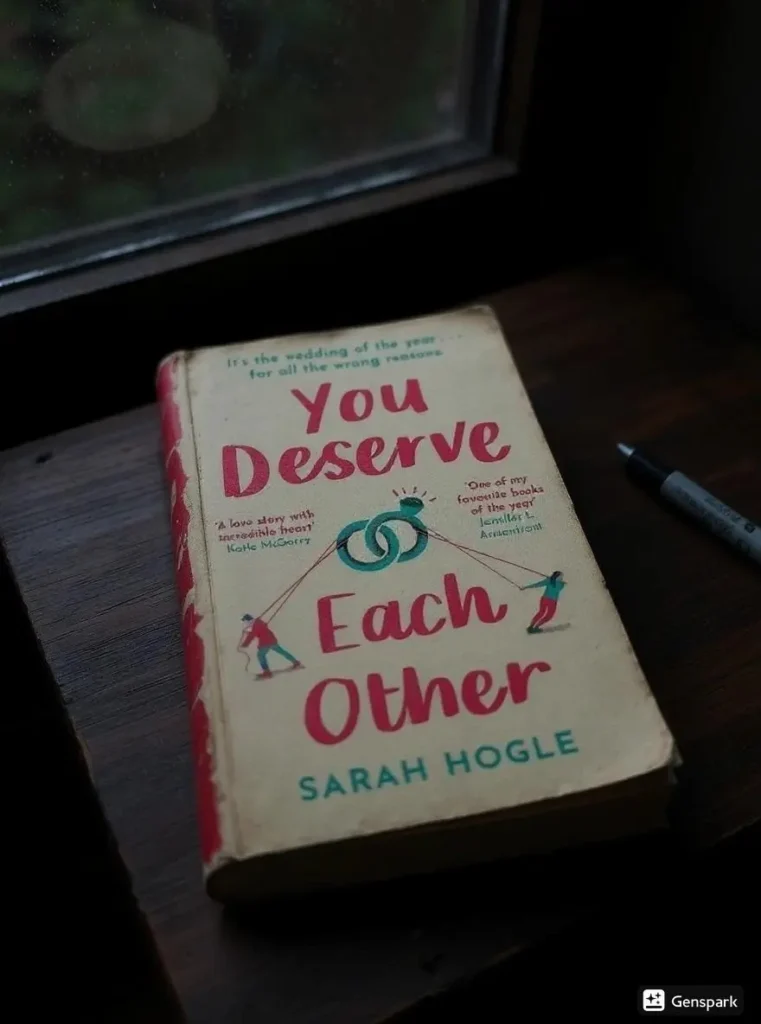
Nicholas Rose’s Emotional Growth And Family Dynamics
Nicholas starts as an infuriating character – emotionally closed off, dismissive of Naomi’s interests, and seemingly more invested in his mother’s approval than his fiancée’s happiness. His arc requires readers to stick with him through genuinely unlikeable behavior.
His family dynamics explain but don’t excuse his emotional unavailability. Growing up with a critical mother who nitpicked every girlfriend created defensive walls. The revelation of his past relationship trauma adds layers without justifying his treatment of Naomi.
His growth feels earned because it requires active work. He can’t just apologize and expect forgiveness – he must learn new communication patterns and challenge his family’s treatment of Naomi.
Writing Style And Literary Technique
Sarah Hogle’s Comedic Voice And Narrative Craft
I honestly can’t believe this was Sarah Hogle’s debut book – her comedic timing rivals veteran authors. She balances humor with genuine emotional depth, never letting jokes undermine serious character development.
The first-person narration from Naomi’s perspective allows intimate access to her anxious thought patterns. Hogle captures the exhausting mental gymnastics of someone who second-guesses every decision while maintaining laugh-out-loud humor.
Her pacing keeps readers engaged through 368 pages without feeling rushed or dragged out. Each chapter ends with enough tension or humor to demand immediate continuation.
Dialogue Construction And Character Voice Authenticity
The dialogue feels natural and character-specific. Naomi’s speech patterns reflect her anxiety – lots of qualifying statements and self-deprecating humor. Nicholas speaks more directly but with underlying tension that suggests deeper emotions.
Supporting characters have distinct voices that serve the plot. Nicholas’s mother manages to be simultaneously hilarious and infuriating through her passive-aggressive commentary and backhanded compliments.
The banter between Naomi and Nicholas crackles with tension and unresolved attraction. Their arguments feel authentic to couples who know exactly which buttons to push.
Setting And Cultural Commentary
Small Town Morris Social Dynamics And Atmosphere
Morris, Illinois becomes a pressure cooker for the couple’s relationship problems. Everyone knows everyone else’s business, making their private struggles public entertainment.
The small-town setting amplifies wedding pressure through community expectations and family involvement. Their families have been planning this wedding for years, adding layers of obligation beyond personal feelings.
“enemies” to lovers, small town, contemporary romantic comedy elements blend seamlessly to create believable stakes and conflicts.
Wedding Industry Satire And Generational Expectations
Hogle subtly critiques the wedding industry’s pressure to create “perfect” celebrations that drain couples financially and emotionally. The $30,000 already spent represents months of Naomi’s salary, highlighting economic pressures on young couples.
Generational differences in relationship expectations create additional conflict. Nicholas’s mother represents traditional views of marriage roles, while Naomi struggles to define herself outside those expectations.
The book addresses how social media and Pinterest-perfect weddings create unrealistic pressure to perform happiness rather than address underlying relationship issues.
Pros
The character development feels genuine and hard-earned. Both protagonists undergo significant growth that requires dismantling toxic patterns rather than simple misunderstanding resolution.
This book is incredibly funny, thoughtful, and romantic without sacrificing emotional depth for cheap laughs. The humor emerges naturally from character flaws and situational comedy.
The mental health representation avoids harmful stereotypes. Naomi’s anxiety is treated as a manageable condition, not a cute quirk or fatal flaw requiring rescue.
The supporting cast adds richness without overwhelming the central relationship. Each secondary character serves specific plot and thematic purposes.
The financial realities of wedding planning and young adult life ground the story in believable stakes that extend beyond romantic drama.
Cons
The pacing occasionally slows during middle chapters where sabotage attempts become repetitive. Some pranks feel more mean-spirited than funny, potentially alienating readers.
Nicholas’s transformation might feel too dramatic for some readers. His shift from emotionally unavailable to vulnerable happens relatively quickly once he commits to change.
The small-town setting, while atmospheric, relies on familiar stereotypes about small-minded communities and interfering families.
Some secondary plot threads (particularly involving Nicholas’s family business) feel underdeveloped and could have been expanded or eliminated entirely.
Performance as a Genre (Contemporary Romance)
“You Deserve Each Other is a sharp and witty look at how relationships take work to succeed, and how being true to yourself and each other is at the very core of a romantic connection” positions this perfectly within contemporary romance expectations while subverting common tropes.
The book succeeds as romantic comedy through authentic humor that emerges from character rather than situation. Unlike many rom-coms that rely on misunderstandings or external obstacles, this story’s conflict comes from internal character flaws and growth.
As contemporary romance, it addresses modern relationship challenges including social media pressure, financial stress, and mental health awareness. The problems feel current and relatable to millennial readers.
The steam level remains relatively low, focusing on emotional intimacy over physical encounters. This choice serves the story’s themes about authentic connection versus performed compatibility.
Reader Experience And Accessibility
The writing style remains accessible to casual romance readers while offering enough depth for more critical analysis. Hogle doesn’t talk down to her audience or over-explain emotional beats.
Trigger warnings should include anxiety/panic attacks, emotionally manipulative family dynamics, and brief mentions of past emotional abuse. The tone remains light despite addressing serious themes.
The book works well for readers new to romance as well as genre veterans seeking fresh takes on familiar tropes. Book clubs will find plenty of discussion material regarding relationship dynamics and personal growth.
At 368 pages, the length feels appropriate for the story being told. Neither rushed nor padded, each chapter contributes to character development or plot advancement.
Comparative Analysis
This debut surpasses many established authors’ work in balancing humor with emotional authenticity. Comparisons to Christina Lauren’s collaborative work feel apt in terms of banter and relationship development.
The enemies-to-lovers execution rivals Tessa Bailey’s rom-coms for sexual tension and character growth, though with less steam and more focus on emotional intimacy.
Unlike typical second-chance romances that rely on external separation, this story keeps the couple together while they rediscover each other. This approach feels more realistic and creates unique dramatic tension.
The small-town setting avoids the cutesy perfection of some romance series, presenting community involvement as both supportive and suffocating depending on circumstances.
Final Verdict
“You Deserve Each Other” exceeds expectations for a debut novel through authentic character development, sharp humor, and emotional depth. While not perfect, it offers a fresh perspective on tired romance tropes and addresses contemporary relationship challenges with wit and wisdom.
I recommend this book for readers seeking character-driven romance with substance beyond the happily ever after. Anyone who’s ever felt lost in a relationship or struggled with people-pleasing will find Naomi’s growth both painful and cathartic.
The book works particularly well for readers transitioning from YA to adult romance, offering mature themes without overwhelming sexual content. Book clubs will appreciate the discussion potential around communication, family dynamics, and personal growth.
Despite minor pacing issues and some underdeveloped subplots, this remains a standout debut that establishes Sarah Hogle as a voice worth following in contemporary romance.
Dionysus Reviews Rating: 7/10
Sip The Unknown—Discover Stories You Never Knew You’d Love!
Dionysus Reviews Has A Book For Every Mood
Biography & Memoir
Fiction
Mystery & Detective
Nonfiction
Philosophy
Psychology
Romance
Science Fiction & Fantasy
Teens & Young Adult
Thriller & Suspense
Frequently Asked Questions
What book turned you into an anxious mess?
This question resonates deeply because anxiety representation in romance often feels either melodramatic or dismissive. Naomi’s panic attacks and overthinking patterns mirror real experiences many readers face daily. The book doesn’t promise that love conquers all mental health struggles, but rather shows how the right partner supports your growth while you do the hard work of healing.
How do you sabotage your own relationships?
While hopefully not through wedding sabotage, most readers will recognize self-destructive patterns in Naomi and Nicholas’s behavior. Whether it’s people-pleasing to the point of losing yourself or building walls to avoid vulnerability, the characters’ flaws feel uncomfortably familiar. The book challenges readers to examine how they might unconsciously push away the people they claim to love.
Can you fall back in love with someone you’ve grown to resent?
This central question drives the entire plot and offers hope for readers in struggling relationships. Rather than suggesting that love conquers all, Hogle shows that rebuilding requires both partners to change and grow. The process isn’t pretty or easy, but it’s possible when both people commit to authentic communication and personal development.
Why do we perform versions of ourselves in relationships?
Naomi’s transformation from people-pleaser to authentic individual addresses how social expectations and family pressure can suffocate individual identity. The book explores why we often present idealized versions of ourselves to romantic partners, then grow resentful when they love the performance rather than our true selves.
What role should families play in adult relationships?
Nicholas’s overbearing mother and Naomi’s well-meaning but enabling parents represent different types of family interference. The book doesn’t suggest cutting off difficult family members but rather establishing boundaries that protect the primary relationship while maintaining important connections.
